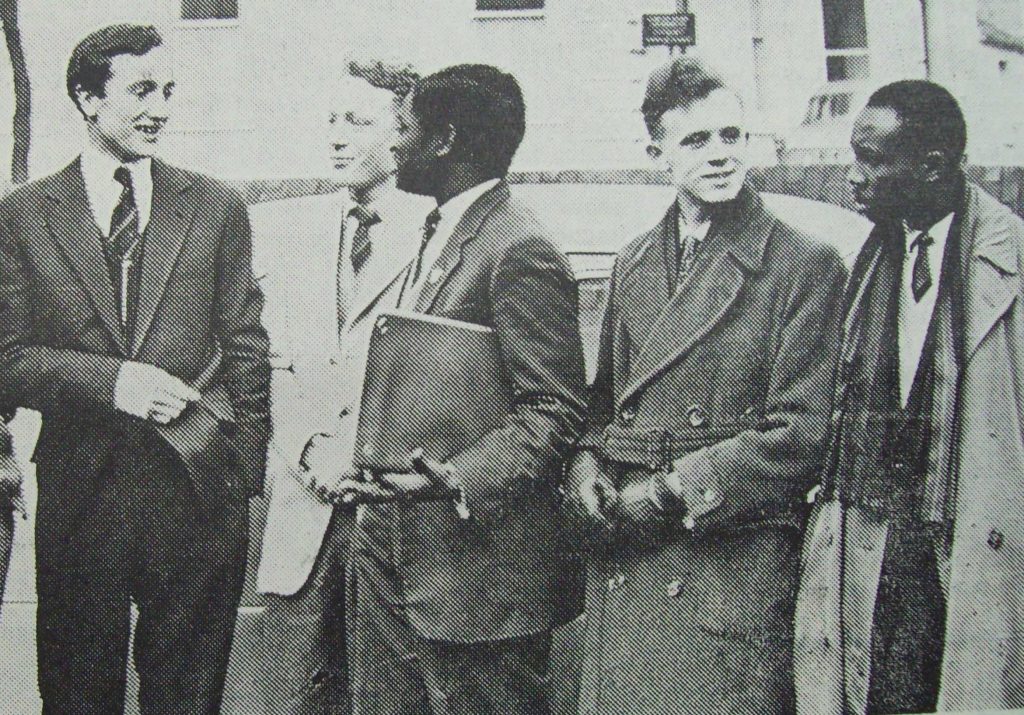Queen’s University Belfast, 28-29 April 2023
The International Consortium for the Study of Africans in Ireland(ICSAI) invites submissions of papers for an interdisciplinary conference on Africa in Ireland: Historical and Theoretical Perspectives

This conference aims to address the historical presence of Africans and the Black diaspora in the past, present, and future on the island of Ireland. It will critically engage with this presence and the convergences of Irish-African cultural, political and religious relationships and connections. How does the presence of African-descended people in Ireland disrupt the notion of Irish monoraciality? How should we theoretically address issues of race in the defining of Irish national identity in light of historical and contemporary Black Irish identities? What is the nature of the relationship between Africa and the African Diaspora in Ireland? What remains of Ireland’s soft religious colonialism and the mission project? How did Ireland’s postcoloniality align with pre- and post-independence subjugated African nations?
Post-Celtic Tiger Ireland, North and South, offers great possibilities to study the “complex, variegated, transitional nature of contemporary Irish experience.” [1] However, whiteness is still the vector through which Irishness is determined. In Ireland, which Luke Gibbons so memorably called “a First World country, but with a Third World memory,” [2] the African and Black diaspora are confronted by an essentialist discourse of impassable racial demarcation. Though Ireland has never been monocultural, its predominant monoraciality ensures that Irishness is interpellated as white. The existence of whiteness is, as Connolly & Khaoury have argued, the “constitutive and founding elements [3] of Irishness, and this Irishness is “ethno-racially rigid” [4].
An additional way to explore and explode the monoraciality of Irish society is through history. Very few studies have looked at the presence of Africans and people of mixed heritage in Ireland, the common street view being that this is a phenomenon connected to the Celtic Tiger and/or post-conflict Northern Ireland, and in good part linked to the refugee question. There is little awareness that Ireland was never wholly white. While a few studies have looked at that past, much work remains to be done, a diachronic understanding and chronology need to be established, and implications need to be explored.
It is important to hear African and African-descent voices in this critical examination. In the study of Ireland’s Black identities and diaspora, as is the case in the rest of Europe, it is necessary to make explicit the authentic and historical specificities of their experiences since they serve to elucidate “global entanglements and trends by tracing the ways in which they are worked out at the personal and local level.” [5]
We are particularly interested in papers that interrogate the following topics within, or in relation to, the framework of the conference theme:
- Black Irish Studies
- Africa in Ireland
- The relationship between Africa and the African Diaspora in Ireland
- Ireland’s soft religious colonialism and the mission project
- Ireland’s postcoloniality and alignment with pre- and post-colonial African nations
- Notions of Blackness and Africanness
- Irishness and Afro-Europeanism
- History of African migrations to Ireland pre- and post- Celtic Tiger
- The interaction of categories like nation, gender, class, and religion within the category of Africans in Ireland
- How Black Irish have conceived themselves historically
- Africans in Irish Studies within the larger field of Black Diasporic Culture/Diaspora Studies
- Negotiating Black Consciousness in Ireland
- Black Cultural Production on the island of Ireland
- The relationships of the Black Irish to other ethnic minorities on the island
- African students in Ireland
- Centring Africa as a decolonised subject for investigation in the Irish curriculum
Please send your abstract of 300 words and a short biographical note to Dr Mark Doyle (mdoyle@mtsu.edu ) by 1 February 2023.
For general conference inquiries, contact Dr Nik Ribianszky (n.ribianszky@qub.ac.uk) or Dr Eric Morier-Genoud (e.morier-genoud@qub.ac.uk).
Conference Committee:
Dr. Mark Doyle, Middle Tennessee State University
Dr. Eric Morier-Genoud, Queen’s University Belfast
Dr. Phil Mullen, Trinity College Dublin
Dr. Nik Ribianszky, Queen’s University Belfast
Dr. Jonathan Wright, Maynooth University
[1] Brown, Terence. 1985. Ireland. A social and cultural history 1922-1985. London: Fontana Press, p. 322.[2] Gibbons, Luke. 1996. Transformations in Irish Culture. Cork: Cork University Press, p. 3.[3] Connolly, P., & Khaoury, R. 2008. Whiteness, Racism and Exclusion: A Critical Race Perspective. In C. Coulter & M. Murray (Eds.), Northern Ireland After the Troubles: A Society in Transition. Manchester: Manchester University Press, p. 208.[4] Lentin, R, & Moreo, E. 2015. Migrant deportability: Israel and Ireland as case studies. Ethnic and Racial Studies, 386, 884–910.[5] Aitken, Robbie, & Rosenhaft, Eve. 2013. Black Germany: The Making and Unmaking of a Diaspora Community, 1884-1960. Liverpool: Liverpool University Press, p. 3This conference is supported by the School of HAPP, the Institute of Irish Studies, iRISE and the Diversity and Inclusion Unit at Queen’s University Belfast.